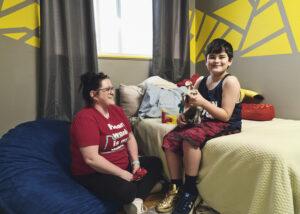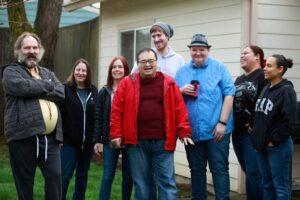Read more about the services ALSO offers to people with intellectual and developmental disabilities.
Read more about the services ALSO offers to people with intellectual and developmental disabilities.


A home accessibility grant is a sum of money or services provided to an individual or an organization for the purpose of making the home environment safer and more accessible. Grants are different from loans in that they don’t have to be repaid. They are also called home modification grants, home repair grants, environmental modifications, and environmental safety modification grants.
Home modification grants are extremely beneficial to individuals with intellectual and developmental disabilities because the resulting accessibility improvements allow them to live safely and independently in their own homes. Independent living is a major step towards full community inclusion…and at ALSO, this is exactly what we’re about. In our 25 years of Heart Work as one of Oregon’s best nonprofit disability service providers, we have seen how home accessibility modifications have facilitated amazing transformations in the lives of people with disabilities.
Let’s talk about how we can work together to help our friends and loved ones in achieving the dream of living on their own.
Home modification grants provide financial assistance to individuals and/or their family members for a wide variety of home improvements. We may have all heard about wheelchair ramps and grab bars, but there are many other assistive technologies that (depending on grant program requirements) may qualify as accessibility improvements:
Thanks to research and an innovative spirit, designers, engineers, and other professionals are continuously developing new ways of assisting all people with disabilities to function in the least restrictive environment possible.
Not all grants are the same. Some apply only to modifications that are located inside the home. Although most organizations would likely cover the ramps or railing necessary to get inside, they might not cover something like access to a patio or gardening area. Additionally, some may include structural alterations such as widening hallways and doorways, but not home repair of those modifications that have already been made.
CHECK IT OUT: Take a look at these amazing accessibility modifications in Sam’s Home Tour!

All home improvement grants have specific eligibility criteria. For many people, including experienced grant writers, determining these criteria can be quite a complex task. Indeed, it can be frustrating to toil through a complex application process, discovering in the end that you weren’t eligible in the first place. As you proceed through your grant search, we suggest that you ask yourself the following questions:
In figuring out if you meet grant eligibility criteria, you don’t need to go it alone. Most grant making organizations welcome questions. Additionally, feel free to contact ALSO. We’d be happy to help in any way we can—email info@ALSOweb.org or call 503-489-6565.

Admittedly, it’s tempting to jump immediately into filling out several grant applications as soon as possible. We suggest first taking time to gain an understanding of what’s needed.
If you’re a person with an intellectual or developmental disability, we suggest that you make a list of activities and tasks that will help you become more independent and safe at home. Consider things that are important to you, such as being able to cook your own meals. It’s always okay to get advice from others. They probably have a lot of great ideas!
For those who belong to the person’s support system, it’s extremely important to ask questions about the type of accessibility modifications they might need. After all, they know themselves best! In addition, professional caregivers, case managers, and healthcare providers have specific knowledge of neurological, behavioral, cognitive, and physical disabilities. They often have excellent insight into the best assistive devices, structural alterations, and technologies.
CHECK IT OUT: Home Accessibility Solutions for People with Intellectual or Developmental Disabilities
Most organizations require an application. At first glance, the application can look daunting, especially for some of the larger foundations. Just take the process step-by-step and ask questions along the way. You’ll get there!
There’s often a great deal of additional information that must be attached to the application. For example:
Before sending off that application, it’s always a good idea to double check and make sure that you have all of the required documents.
Grant applications often have very strict submission deadlines. Plan ahead so that you can get your application in on time.
CHECK IT OUT: Get some great information here on the costs of several common accessible modifications.

It’s always possible that a grant request is turned down, or for some reason, you just can’t find one that fits your situation. Don’t worry– it happens to the best of us, no matter how hard we try. If it’s feasible, you might want to contact the funding organization to learn why you didn’t receive the grant award.
There are also other options available to get the modifications, critical repairs, structural alterations, and assistive technology that you need for your home.
Like grant opportunities, loans, tax deductions, and Medicaid Waiver programs have specific eligibility criteria. Try to get a knowledgeable staff member to help out.
Now that we have navigated through the rather complex world of home accessibility and modification grants, let’s go over the important points once again.

Wouldn’t it be wonderful if you, as a parent, friend, or relative, knew that the person you care about was thriving safely and happily in their own home? Wouldn’t it be great if you, your friends, or your family members who might have a disability were free of constraining barriers (such as stairs) in the communities where they work, play, and interact with others? At ALSO, we are strong advocates of people with intellectual and developmental disabilities and work hard for a future in which all people enjoy full inclusion in vibrant, diverse communities.
Even though we provide accessible housing, organizations like ALSO aren’t eligible for the types of funding opportunities that we have described. This is why we request donations to provide residential and supportive living services that include real homes based on the highest standards of home accessibility. Your kind donation will help us ensure that everyone has the same opportunities at home, in the workplace, and in the community. Be a partner in our Heart Work!

Sign up for our newsletter to get our latest news, content, and job opportunities.
Help us ensure that everyone has the same opportunities in their home, workplace and community. Let’s make dreams!
